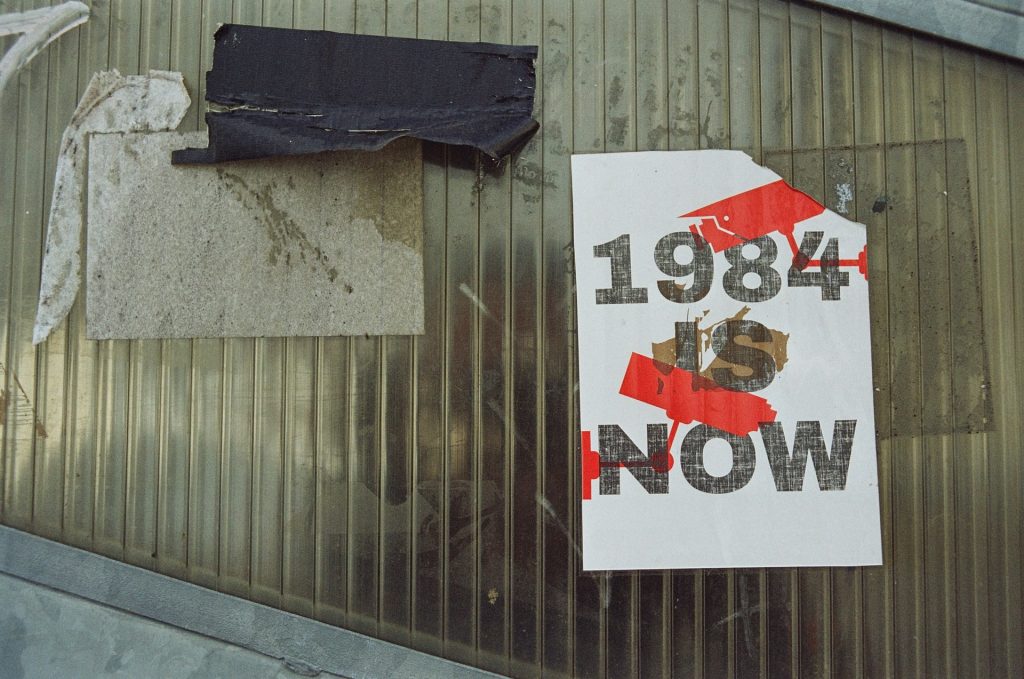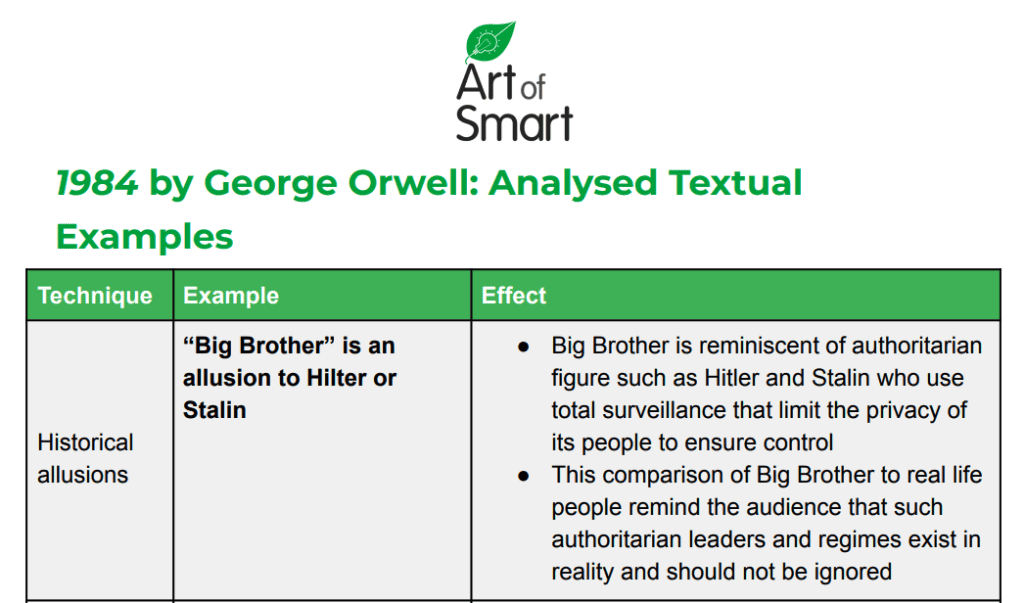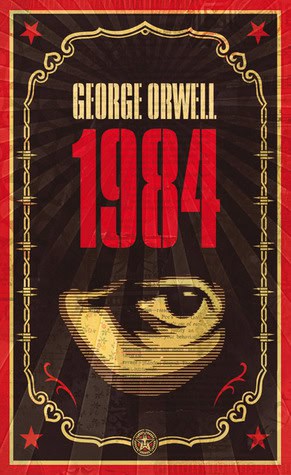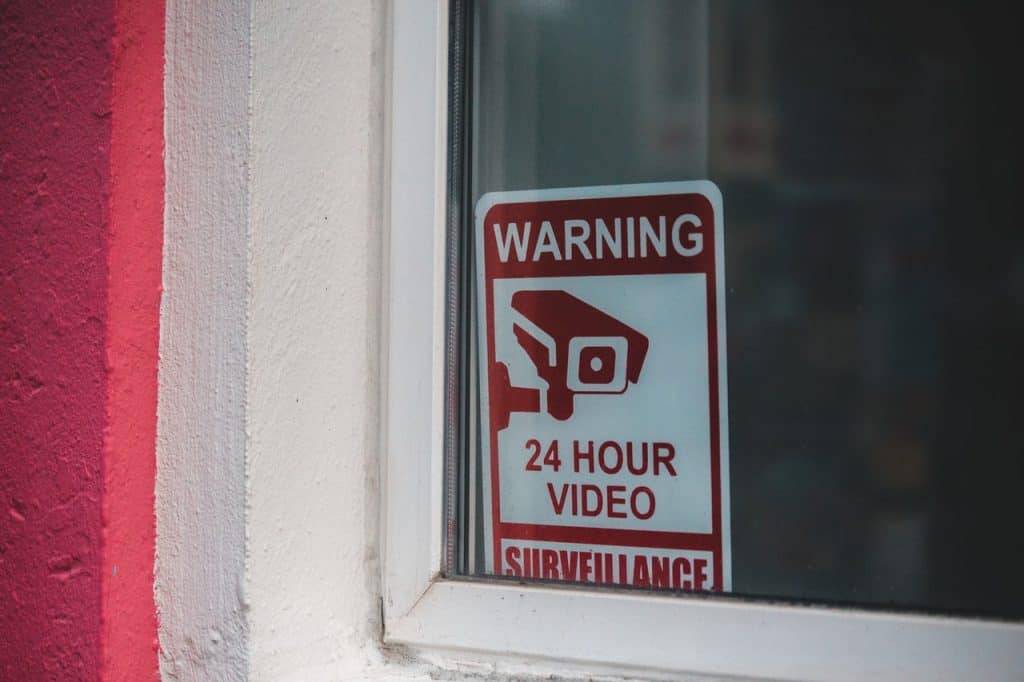Newspeak? Doublethink? What do all of these words mean? If you need help analysing 1984 by George Orwell, you’ve come to the right place — we’ve got all you need to know with a summary, list of key characters, themes and a 3-step essay analysis guide!
We’ve even got an analysis table and a sample paragraph that’s all free for you to download on 1984.
So, let’s throw back into 1984 (the fictional one of course)!
1984 by George Orwell Summary & Key Messages
Key Characters in 1984
Context
Themes Explored in 1984
Essay Analysis of 1984
1984 by George Orwell Summary & Key Messages
The Politics of Oceania
1984 belongs in the dystopian, science fiction genre as it explores the dangers of corrupted power under a totalitarian regime. Totalitarianism is a government system that dictates how its citizens think, behave and act by constantly keeping an eye on them and carrying out punishments for those who don’t obey. Sounds strict, hey?
Sadly, this is the life of our protagonist, Winston Smith. Winston lives in a nation that resembles London in Oceania, which has been in a war with Eurasia and Eastasia since forever but no one really knows what the war is about. This is because the Party controls its people through rewriting history in the Ministry of Truth, where Winston edits historical records as part of his job.
The Party also invented a new language called “Newspeak”, which eliminates any words associated with rebellion to ensure full subservience of their nation.
Wherever Winston goes, he is bombarded with posters of their omnipresent leader, Big Brother. There are also hidden cameras and microphones that are implanted everywhere by the thought police to monitor every move of its citizens.
It’s a scary place because if you do or say anything wrong, the thought police will capture you and force you into lifelong labour. In this world, people cannot have close friends, cannot date whoever they want and cannot have intimate relationships.
Instead, the people pent up these emotions and channel them into aggressive patriotism for their government which are expressed in two minute hate rallies.
The Start of Winston’s Rebellion
Winston has had enough of the Party and its strict control. He purchases an illegal diary to commit crimethink, where he expresses his own thoughts and feelings about the Party through writing. He also writes about his interest in O’Brien, a member of the Inner Party who he believes could be part of the underground rebellion group called the Brotherhood.
Winston’s and Julia’s Relationship
At work, Winston realises that his historical records were not aligning with his memories. He notices Julia, a young beautiful girl staring at him, and he is afraid that she will turn him into the “thought police”.
However, Julia passes him a note that says “I love you” and they start an affair.
O’Brien’s Betrayal
As their relationship grows more seriously, so does Winston’s hatred for the Party. He and Julia decided to reveal their rebellion to O’Brien, who also appeared to be on their side.
O’Brien welcomes them into the Brotherhood and passed Winston a copy of Emmanuel Goldstein’s book. As Winston starts reading the book, the thought police charge in, arrest Winston and Julia and bring them to the Ministry of Love. Turns out, O’Brien is a snake.
The Party Tortures Winston
At the Ministry of Love, Winston is tortured mercilessly and this makes him confess everything he knows about Julia and the rebellion.
It is then revealed that the government carries out these acts to exercise total power and control over the people of Oceania, to the extent where people not only do things out of fear, but genuinely believe in what they are doing even if it doesn’t make sense.
Winston’s Loss of Individuality
In Room 101, Winston experiences a true Fear Factor episode. The thought police threaten Winston with his ultimate fear, rats that would eat his face off. This caused Winston to scream “Do it to Julia, not me!”, which represents his betrayal to the only person that held value to him.
After this, the thought police let both Winston and Julia go, but the two ex-lovers can no longer look at each other face to face as they are both broken inside. Winston becomes a changed man who does not want to think about rebelling and instead becomes highly supportive of the Party and Big Brother.
Key Characters in 1984
Winston Smith
The main protagonist who works under the Ministry of Truth in London, Oceania. His appearance is frail, pensive and intelligent.
He hates the Party and its totalitarian system with a desire to revolutionise his current political situation. He can be emotional and idealistic with his goals.
Julia
A beautiful young girl who is Winston’s love interest. Julia is sex-positive with an optimistic attitude about the future of the Party.
She represents parts of humanity that Winston lacks, such as passive survival, intimacy, intuition and pragmatism.
O’Brien
A mysterious leader of the Inner Party who Winston trusts as Winston believes that O’Brien is a member of the legendary rebellion group, the Brotherhood. It is revealed later in the novel that O’Brien is a leader of The Party who has been keeping a close eye on Winston.
His betrayal launches us into the inner mechanisms of The Party and its totalitarian rule. O’Brien’s character parallels that of famous dictators in modern history such as Stalin and Hitler, as he is determined to indoctrinate Winston in the name of “purity.”
Big Brother
Have you watched the show Big Brother? His character in the show is almost the same as in 1984, except a lot more controlling.
In 1984, Big Brother is the most dominating figure in Oceania as he is perceived to be the ruler, although Orwell does not specify whether he really exists or not. Big Brother’s face is plastered among posters, coins and telescreens with the slogan “BIG BROTHER IS WATCHING YOU” so it’s impossible to avoid him anywhere.
Emmanuel Goldstein
As the leader of the legendary group of rebels called the Brotherhood, Emmanuel Goldstein is the opposing figure of Big Brother.
Although he never appears in the novel, he has had a profound impact on Winston’s hope for the future. He is the most dangerous man in Oceania, according to the Party.
Context in 1984
To understand 1984’s context, we must first understand the author’s personal background to craft a well thought-out essay analysis. This is because the author’s personal and historical experiences do shape the novel and its themes. So, let’s start with Orwell’s schooling days.
If you ever felt suppressed at school, Orwell can definitely relate with you on that. As a “lower-upper-middle class”, Orwell didn’t fit in with his peers and was upset with the restricted routine that schools impose on their students.
He then went on to become a British Imperial Policeman in Burma where he hated his job as he had to execute strict laws under a political system he didn’t like. After this, he moved to England and became a full-time writer.
Orwell experienced poverty for awhile, and even lived as a coal miner in northern England which caused him to shift from capitalist ideals to democratic socialism. Here are the simplified definitions of the political concepts that influenced Orwell’s beliefs and 1984’s themes:
- Capitalism: An economic system where property is owned and controlled by private actors, rather than by state. As such individuals can control how much they set their prices, instead of leaving it to the government to dictate.
- Democratic Socialism: Unlike capitalism, democratic socialism is an economic system whereby property and products are owned and controlled by the entire society, alongside governments. So, the main difference here is that governments have a say in trade whereas in capitalism, governments do not interfere with private owner’s business.
Orwell was also concerned with the rise of Thatcherism.
In the year 1936, Orwell fought as a socialist in the Spanish Civil War during World War II, where he became familiar with totalitarian systems that are under leaders such as Hitler and Stalin. Although Orwell was passionate about socialism at first, he soon became disillusioned and disappointed with its ideals as Stalin used communism as the foundation of his authoritarian system.
Stalin of the Soviet Union was also an important influence in shaping 1984’s totalitarian regime of Oceania, as Stalin used secret police to force confessions out of enemies through torture alike how the Ministry of Love did with Winston. Like the Party, the Soviet Union also tampered with physical records of people as they imprison and/or eliminate millions of lives.
With the rise of the nuclear age and television in 1949, Orwell envisioned a future where everyone would always be monitored through screens in a post-atomic dictatorship. This became a fear that was highly possible when speculated thirty five years into the future.
But as we all know, this did not become true. In the early 1990s, the Cold War ended with the triumph of democracy, as signified by the fall of the Berlin Wall and the dissolution of the Soviet Union.
Even so, Orwell’s 1984 still serves as a precautionary tale against the corruption and abuse of totalitarian regimes, along with a profound insight into the use of language and history to manipulate one’s individuality.
Want more information on George Orwell? Take a look at this biography found via the Orwell Foundation page!
Themes Explored in 1984
To help you get started on your thesis or topic sentence, here are three key themes from 1984 that you can write about in your essay analysis!
The Consequences of Totalitarianism
After experiencing the violence and corruption of totalitarian regimes in Spain and Russia, Orwell wrote 1984 as a warning about the dangers of an authoritarian regime where the government holds the most power. As such, the Party in 1984 administered extreme methods of physical and psychological manipulation to enforce total submission of its people.
Physical control by the Party includes total surveillance of its people to the extent where even a twitch in the face can be enough to warrant an arrest. Morning exercises, called Physical Jerks, are also carried out before long hours at work to tire people out so they don’t have the energy to think beyond the Party’s propaganda.
The Party also uses physical torture to “re-educate” and punish those who rebel against them. It is this physical pain that causes Winston to lose his own individuality and moral beliefs, allowing the Party to infiltrate his mind and dictate his sense of reality.
Meanwhile, the Party also uses psychological tactics to saturate the individual’s mind with propaganda and disable its ability for independent thinking. On top of watching everyone everywhere, the telescreens are also used to indoctrinate (ie. brainwash) people into supporting the Party despite its flaws.
The telescreens also perpetuate slogans such as “BIG BROTHER IS WATCHING YOU”, to remind people that their government is always watching their back so they better behave according to the Party’s standards.
The Party also deems close friendships and conversations with others illegal. So, if you’re itching to spill the tea, your only method of venting your emotions out is through pep rallies, where the Party encourages you to show extreme expressions of hatred to its political enemies. Ultimately, this allows the Party to dictate how and where you should express your emotions, keeping you from expressing your individual feelings, thoughts and opinions.
Here are some quotes that illustrate the perils of totalitarianism:
| Quote | Link to the Consequences of Totalitarianism |
|---|---|
| “Big Brother is Watching You” | This slogan represents how the Party constantly monitors its people and instills psychological fear to enforce total control over its citizens. |
| “We convert him, we capture his inner mind, we reshape him” | This line from O’Brien reveals the Party’s motive of gaining total control over people’s minds by forcing them to forfeit their independent thought and truly believing in whatever the Party wants them to believe in. |
| “You want it to happen to the other person. You don’t give a damn what they suffer. All you care about is yourself.” | This line from Julia as she speaks to Winston about what happened in 101 reveals that the both of them have betrayed one another as a result of the torture they’ve experienced under the Party, which represents their loss of morality and individual values under cruel physical control of authoritarian regimes. |
The Power of Language to Liberate and Control
In 1984, language has the dual capacity to both restrain and facilitate individual expression. This is another key message that Orwell imparts, as he highlights how language can either promote or limit ideas which influence our beliefs, behaviour and identity.
The Party uses Newspeak as a way of controlling the language that its people speak, which in turn dictates the people’s thoughts, actions and personalities (or lack thereof).
By eliminating words that are associated with rebellious thoughts, the Party essentially removes the people’s ability to think of resistance because there are no words to conceive it. With continual edits with Newspeak, the Party inches a step closer to their ultimate goal of total coercion from their people.
Yet, in Winston’s case, he uses language as a vehicle of self-expression as he purchases a diary for himself and writes his everyday thoughts, opinions and feelings into it. By writing in his own words, he is able to build himself an identity with his own passions, goals and perspective.
Sadly, in a world where the government overrules individual expression, Winston’s use of language dwindles, though it is encouraging to see how language can still work to preserve independent thought.
Here are three quotes that can help you get started on this theme:
| Quote | Link to the Consequences of Totalitarianism |
|---|---|
| “WAR IS PEACE FREEDOM IS SLAVERY IGNORANCE IS STRENGTH” | This official slogan of the Party is an example of “doublethink” that is used to instil propaganda and fear, forcing its people to believe anything they say even when it is contradictory and illogical. (eg. Ministry of Truth is where history is rewritten, Ministry of Love is where people are tortured, Ministry of Peace is head of war). |
| “Don’t you see that the whole aim of Newspeak is to narrow the range of thought? In the end we shall make thoughtcrime literally impossible, because there will be no words in which to express it.." | This represents the Party’s use of language to restrain any thought of rebellion against its political campaign and enforce subservience. |
| “Freedom is the freedom to say that two plus two make four. If that is granted, all else follows” | This line from Winston reinforces the power of language to reclaim his perspective of the world moves beyond the indoctrinations from the Party. |
The Importance of Preserving Our Identity and Individualism
What happens if we lose everything that defines us as us?
1984 truly delves into this scary concept as the Party removes everyone’s personal details so they are not able to establish their own identity. For example, even Winston does not know his own age, who his real parents are nor can he trust his own childhood memories as there are no photographs or evidences to help him differentiate between reality and imagination.
Aside from Winston, the rest of Oceania are also denied documents that could give them a sense of individuality and help them differentiate themselves from others. This causes their memories to grow fuzzy, thus making the people of Oceania vulnerable and dependent on the stories that the Party tells them.
In turn, by controlling the present, the Party can re-engineer the past. Simultaneously, by controlling the past, the Party can rationalise its shortcomings and project a perfect government that is far from the truth.
With no recollection of the past, the people of Oceania can no longer stay in touch with their real identities and instead, become identical as they wear the same uniform, drink the same brand of alcohol and more. Yet, Winston builds his own sense of identity through recording his thoughts, experiences and emotions in his diary. This act along with his relationship with Julia symbolises Winston’s declaration of his own independence and identity as a rebel who disagrees with the Party’s system.
Despite this, Winston’s own sense of individuality and identity dissolves after his torturous experience at the Ministry of Love, which transforms him into another member of the Outer Party who blends into the crowd. By asserting a dark vision of humanity’s individualism, Orwell urges audiences in the present to truly value their freedom to express and preserve their identity.
Here are some quotes that are related to this idea which you may find helpful:
| Quote | Link to the Consequences of Totalitarianism |
|---|---|
| “Who controls the past, controls the future: who controls the present controls the past” | This slogan from the Party reveals that by rewriting history, the Party can justify their actions and systems in the present. Alternatively, by controlling the present, they can choose to manipulate history however they like. |
| “What appealed to [Winston] about [the coral paperweight] was not so much its beauty as the air it seemed to possess of belonging to an age quite different to the present one” | This quote from Winston represents his act of rebellion which helps him to assert his own independence in determining what he likes or does not like that are outside of the Party’s influence. |
| “And when memory failed and written records were falsified… the claim of the Party to have improved the conditions of human life had go to be accepted, because there did not exist, and never again could exist.” | This quote represents Winston’s realisation that the Party purposefully erodes people’s memories of the past to disable their sense of identity and gain full control of their sense of self. |
Of course, 1984 also includes other themes that you may be thinking about writing analysis for, such as:
- Rebellion and Patriotism
- Active versus Passive Survival
- The Corrupt Use of Technology
Check out our recommended related text for 1984.
Essay Analysis: How to Analyse 1984 in 3 Steps
Analysing your text is always the first step to writing an amazing essay! Lots of students make the mistake of jumping right into writing without really understanding what the text is about.
This leads to arguments that only skim the surface of the complex ideas, techniques and elements of the text. So, let’s build a comprehensive thesis through an in-depth analysis of the 1984.
Here are three easy steps that you can use to analyse 1984 and really impress your English teachers!
Step 1: Select your example(s)
1984 is a world of its own with its totalitarian systems, use of foreign words and more. So, we totally understand if you’re feeling lost and don’t know where to begin.
Our piece of advice is to look for examples that come with a technique. Techniques offer you a chance to delve into the text’s underlying meaning, which would help you deepen your analysis and enrich your essay writing.
Find our extensive list of quotes from 1984 by George Orwell!
Here are two quotes that relate to consequences of totalitarian power, which we have picked to help you visualise which examples can provide a deeper meaning:
“Big Brother is Watching You.”
“WAR IS PEACE
FREEDOM IS SLAVERY
IGNORANCE IS STRENGTH”
Step 2: Identify your technique(s)
Getting a good grade in English is more than listing out every technique that you can find in the text. Instead, it’s about finding techniques that allow you to dive deeper into the themes you’re focussing on, while also supporting your argument.
Try to look for techniques that allow you to explain its effects and link to your argument such as symbols, metaphors, connotations, similes and historical allegories. In Orwell’s case, he uses a lot of language techniques such as neologism, where he makes up his own words such as “Doublethink” or “Newspeak”.
For the two quotes above, its three techniques include historical allusion, rhetoric and oxymoron.
If possible, you can look out for a quote that encompasses a few techniques to really pack a punch in your analysis.
Step 3: Write the analysis
Once you’re done collecting your examples and techniques, the next part is writing. You must remember to explain what the effect of the technique is and how it supports your argument. Otherwise, it’s not going to be a cohesive essay if you’re just listing out techniques.
An example of listing out techniques looks like this:
“The rhetoric “Big Brother is Watching You” is also a historical allusion while “War is Peace, Freedom is Slavery and Ignorance is Strength” is oxymoronic.”
Instead, you must elaborate on how each of these techniques link to your argument.
“Big Brother is Watching You” is a rhetoric imposed by the Party to instil psychological fear and submission of the people of Oceania, whereby Orwell uses to warn the dangers of totalitarianism. “Big Brother” is also a historical allusion to Hitler to remind the audience that 1984 is not entirely fictional but a possible future of our reality, urging us to take action against totalitarian regimes with the autonomy we have now.
Meanwhile, the slogan ““WAR IS PEACE, FREEDOM IS SLAVERY, IGNORANCE IS STRENGTH” represents the oxymoronic mentalities that have been indoctrinated into the people of Oceania, highlighting how totalitarian regimes would force its people to think whatever they want their people to think, no matter how illogical it is.
Together, your analysis should look something like:
The Party perpetuates the rhetoric, “Big Brother is Watching You” to instil psychological fear and coercion of the the people of Oceania, which forewarns a lack of individual freedom and private reflection within authoritarian regimes. As “Big Brother” is a historical allusion to Hitler, Orwell reminds the audience that 1984 and its extremist politics is a reality, urging us to defend our independence before it’s forbidden. Furthermore, the slogan “War is Peace, Freedom is Slavery, Ignorance is Strength” embodies the oxymoronic mentalities that the Party indoctrinates into its people, revealing the extreme extent of psychological control an authoritarian regime strives to ensure their power is never questioned, no matter how irrational it is.
Need some help with your essay analysis of other texts aside from 1984?
Check out other texts we’ve created guides for below:
- Romeo and Juliet
- Run Lola Run
- King Lear
- Jane Eyre
- The Meursault Investigation
- In Cold Blood
- Persepolis
- To Kill a Mockingbird
- The Book Thief
- The Tempest
- Blade Runner
- Things Fall Apart
- Mrs Dalloway
- Mabo
Are you looking for some extra help with your essay analysis of 1984?
We have an incredible team of tutors and mentors!
We can help you master your essay analysis of 1984 by taking you through the summary, context, key characters and themes. We’ll also help you ace your upcoming English assessments with personalised lessons conducted one-on-one in your home or online!
We’ve supported over 8,000 students over the last 11 years, and on average our students score mark improvements of over 20%!
To find out more and get started with an inspirational tutor and mentor, get in touch today or give us a ring on 1300 267 888!
Kate Lynn Law graduated in 2017 with an all rounders HSC award and an ATAR of 97.65. Passionate about mentoring, she enjoys working with high school students to improve their academic, work and life skills in preparation for the HSC and what comes next. An avid blogger, Kate had administered a creative writing page for over 2000 people since 2013, writing to an international audience since her early teenage years.









